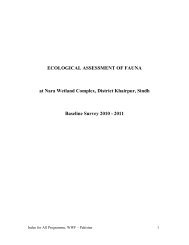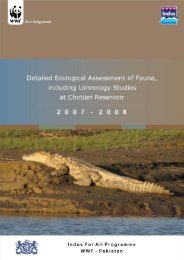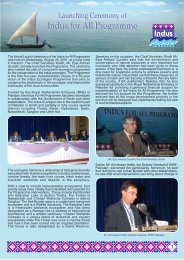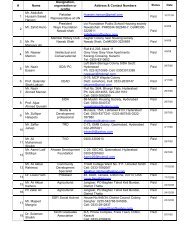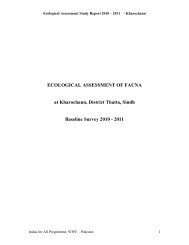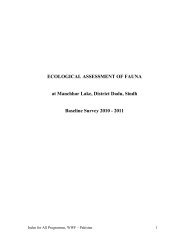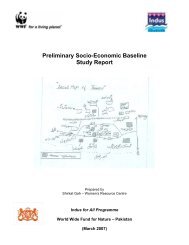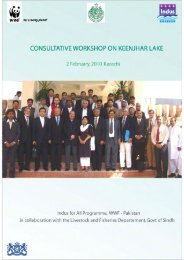Untitled - WWF - Pakistan
Untitled - WWF - Pakistan
Untitled - WWF - Pakistan
You also want an ePaper? Increase the reach of your titles
YUMPU automatically turns print PDFs into web optimized ePapers that Google loves.
Detailed Ecological Assessment Report 2008 – Keenjhar Lake<br />
Figure 4 shows the number of species that fall under two local status categories<br />
i.e. common, less concern and common. Most of the species came under<br />
common (10 in summer and 9 in winter) followed by less frequent (4 in summer<br />
and 1 in winter).<br />
Figure 4 – Distribution of small mammal status over the species and season at<br />
Keenjhar Lake<br />
No. of species<br />
10<br />
8<br />
6<br />
4<br />
2<br />
0<br />
Summer Winter<br />
Common<br />
Less common<br />
3.2.6 Threats and recommendations<br />
3.2.5.1 Threats<br />
• Coal mining and the associated disturbance near Chul is removing or<br />
degrading the habitat of species such as Little Indian field-mouse and<br />
Cairo spiny-mouse;<br />
• Extraction of stone and quarrying around the lake peripheries are<br />
destroying the habitat of many of the non-burrowing species.<br />
• The Jogi, Bheel and Bar communities are involved in trapping small<br />
mammal species, especially Desert Hare and Indian Porcupine;<br />
• The current heightening of the lakes embankment is increasing the<br />
disturbance of the area. It is also envisaged that increased water levels<br />
will also increase the water-logging of adjacent areas resulting in flooding<br />
of burrowing mammal habitats.<br />
3.2.5.2 Recommendations<br />
• The relevant authorities should ensure that any illegal mining is stopped<br />
(Keenjhar Lake is a designated Wildlife Sanctuary). If these activities are<br />
to be carried out then they should be only in prescribed areas and that<br />
some areas are left undisturbed from any such activity;<br />
• The Sindh Wildlife Department should strictly enforce the wildlife act and<br />
discourage the hunting of small mammals. Alternatively, community<br />
managed game reserves could be initiated and hunting of such species<br />
could be brought under licensing controlled by the local communities<br />
which in turn with provide financial incentives for community to protect<br />
wildlife;<br />
<strong>WWF</strong> <strong>Pakistan</strong> – Indus for All Programme Page 42 of 165



